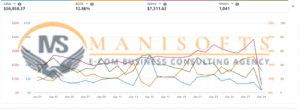Overview
In this case study, we break down how our team generated $56,858.37 in Amazon sales, achieving a 12.86% ACOS and over 1,041 orders within just one month (April). With only $7,311.63 in ad spend, we implemented a targeted, data-driven Amazon PPC strategy that maximized ROI and minimized wasted spend all in a highly competitive product category.
If you’re looking for scalable and profitable Amazon PPC strategies, this real-world example offers clear insights.
Client Background
- Niche: Electronics
- Target Market: US-based Amazon customers
- Monthly Revenue (Before PPC): ~$25,000 average
- Goal: Double sales while maintaining an ACOS under 15%
- Challenges:
- Saturated market with aggressive competitors
- Rising CPCs (Cost Per Click)
- Redundant spend on underperforming keywords
Objectives
| Objective | Target |
|---|---|
| Increase total sales | +100% MoM |
| Maintain low ACOS | ≤ 15% |
| Scale orders with profitable keywords | > 1,000 orders |
| Reduce wasted ad spend | Cut non-converting terms |
Our PPC Strategy
We designed and executed a 5-pillar PPC framework:
1️⃣ Deep Keyword Research & Segmentation
We used Helium 10, Amazon Brand Analytics, and Search Term Reports to extract high-intent keywords.
Actions:

- Split campaigns into Branded, Competitor, and Generic keywords
- Focused on long-tail, low competition phrases
- Set exact, phrase, and broad match groups for precise control
2️⃣ Campaign Structuring for Scalability
We built single-ASIN campaigns and product targeting ads to control budgets and boost top-performing SKUs individually.
Actions:
- Launched Auto + Manual campaigns
- Used Product Attribute Targeting (PAT) to target competitor ASINs
- Prioritized high-margin SKUs for increased ad push
3️⃣ Bid Optimization & Budget Reallocation
We optimized bids weekly, increasing bids on high-CTR and high-conversion keywords while pausing or reducing low-performing ones.
Actions:
- Used dynamic bidding (down only) to control CPC
- Leveraged placement adjustments for Top of Search
4️⃣ Negative Keyword Implementation
To reduce wasted ad spend, we continuously added negative keywords based on search term performance.
Actions:
- Added irrelevant search terms as phrase and exact negatives
- Blocked high-impression, zero-sale keywords
5️⃣ Performance Monitoring & Iterative Scaling
Our team monitored KPIs daily and adjusted strategy every 7 days.
Actions:
- Analyzed ACOS, CTR, CVR (Conversion Rate) trends
- Increased budgets on profitable campaigns by +20%
- Used dayparting to optimize ads for best-converting hours
Key Performance Metrics (April)
| Metric | Result |
|---|---|
| Sales | $56,858.37 |
| Orders | 1,041 |
| Ad Spend | $7,311.63 |
| ACOS | 12.86% |
| ROAS | 7.78x |
| CTR | 2.4% avg |
| Conversion Rate | 16.9% avg |
Results Breakdown
- +127% increase in total monthly sales
- ACOS dropped by 18% from previous campaigns
- Generated 1,041 orders, doubling the client’s usual volume
- Identified top 10 keywords that accounted for 63% of sales
- Cut ad spend wastage by 23%, improving budget efficiency
Lessons Learned & Best Practices
- Keyword Segmentation Drives Efficiency: Splitting branded, competitor, and generic terms allowed for better bid control.
- Consistent Search Term Harvesting is key to filtering winners from losers.
- Single-ASIN Campaigns provide clear visibility and control over budget allocation.
- Dayparting & Placement Adjustments can boost ROAS by showing ads at peak buyer times.
- Continuous Testing (creatives, ASIN targeting, bids) ensures sustainable growth.
